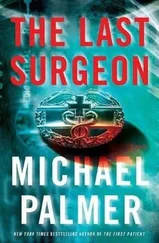Michael Palmer - The Society
Здесь есть возможность читать онлайн «Michael Palmer - The Society» весь текст электронной книги совершенно бесплатно (целиком полную версию без сокращений). В некоторых случаях можно слушать аудио, скачать через торрент в формате fb2 и присутствует краткое содержание. Жанр: Триллер, на английском языке. Описание произведения, (предисловие) а так же отзывы посетителей доступны на портале библиотеки ЛибКат.
- Название:The Society
- Автор:
- Жанр:
- Год:неизвестен
- ISBN:нет данных
- Рейтинг книги:5 / 5. Голосов: 1
-
Избранное:Добавить в избранное
- Отзывы:
-
Ваша оценка:
- 100
- 1
- 2
- 3
- 4
- 5
The Society: краткое содержание, описание и аннотация
Предлагаем к чтению аннотацию, описание, краткое содержание или предисловие (зависит от того, что написал сам автор книги «The Society»). Если вы не нашли необходимую информацию о книге — напишите в комментариях, мы постараемся отыскать её.
The Society — читать онлайн бесплатно полную книгу (весь текст) целиком
Ниже представлен текст книги, разбитый по страницам. Система сохранения места последней прочитанной страницы, позволяет с удобством читать онлайн бесплатно книгу «The Society», без необходимости каждый раз заново искать на чём Вы остановились. Поставьте закладку, и сможете в любой момент перейти на страницу, на которой закончили чтение.
Интервал:
Закладка:
“Dr. Willard Grant.”
To polite applause, Will took the stack of notes he and Lemm had prepared, which included pages with the PowerPoint slides printed on them, and woodenly approached the podium. Clearly, he appreciated now, it would have been better to go second. With no idea what approach Halliday was planning to take, he would have to stick to the script he and Lemm had put together.
“It has been well over twenty years,” he began, “since the onset of myriad attempts to reform the fee-for-service delivery of medical care that many physicians grew up with. The current incarnation, an alphabet soup of various forms of managed health care, has pitted physicians and patients alike against insurance companies, physicians against other physicians, and even physicians against patients. There are lawsuits upon lawsuits, skyrocketing physician dissatisfaction, rampant early retirement, and an unprecedented malpractice crisis.
“Many managed-care programs feature coverage called capitation, in which primary-care physicians are paid a set amount to deliver care to a patient for a year. Any lab tests, X-rays, and specialist consultations are paid for from that up-front money. What remains at the end of a year is what the physician gets to use to pay the expenses of his practice and feed his family. The initial amount paid is hardly large, and primary-care physicians know they are in essence being paid to cut corners. If a doctor goes over the budget in his evaluation and treatment, the excess is his responsibility.”
Will glanced briefly at the audience for anyone nodding in sympathy and understanding with his points. If there were such people out there, he missed them. A few already seemed asleep. With the help of the PowerPoint tables and charts, Will illustrated that there are more uninsured now than there were before health-care reform began-more than forty million. He spoke of the more than 350,000 patients refused care in hospital emergency rooms last year because they couldn’t pay. He showed graphs comparing the per-patient cost in the U.S. versus countries with national health insurance, such as Canada and Great Britain. Careful to omit the three who had recently been murdered, Will listed the astronomical salaries and stock holdings of the top ten managed-care executives in New England. He was just halfway through his initial presentation when Roselyn Morton announced that he had one minute left.
Surprised and flustered, Will tried to sift through his notes to those facts he felt would have the most impact. What he succeeded instead in doing was to shove most of the sheets over the edge of the podium, where they floated to the floor like mutant leaves. For the first time since he began his presentation there was a reaction from the audience-a collective gasp, peppered with some sympathetic whispers and some not-so-sympathetic laughter. For a frozen moment, Will stood there, uncertain whether to go for his notes or to try and ad lib one or two final points. Instead, with a mumbled thanks, he scooped up the sheets and returned to his seat.
“You did great,” Lemm whispered.
“Did you like that little touch at the end? Inspired, I think.”
“Who hasn’t dropped something in their life?”
“I’m sure they’re all thinking that very thing, Tom, and not something like, He’s a surgeon? ”
Boyd Halliday, smiling, strutted up to the microphone, his white hair glistening beneath the elegant chandelier.
“Rumor has it,” he began, “that the President is going to create a new cabinet post to oversee managed health care. However, Congress has insisted that the secretary he appoints will only be allowed to hold office for three days.”
Will groaned. Two seconds and the man had already won over the audience with self-deprecating humor. A minute later, Halliday switched on a film, possibly done by an Oscar winner, which made managed care seem responsible for everything that was good about America and American medicine. Where Will’s data was presented in PowerPoint, with a character occasionally moving aimlessly on the screen, Halliday’s film, Together We Can Make a Difference , used Disney-level animation and a score that had some in the audience tapping their feet. Where Will presented columns of statistics, Halliday showed smiling children and scrubbed Midwesterners, each relating a heartwarming account of how their managed-care company came to the rescue during their darkest hour. What statistics he did present had to do with unchanged maternal/child health despite strict HMO limitations on their hospital stay together, and patient satisfaction that exceeded surveys done when fee-for-service was the way to go.
Halliday’s final minutes were spent looking at cost savings for various medical conditions since the managed-care revolution. By the time he had finished, Will doubted there was a soul in the hall who wasn’t a believer in the man’s cause. Both Will and Lemm took notes for the rebuttal period, but there was so much flash and so little substance in Halliday’s presentation that it was hard to find any point on which they could gain much purchase.
You want to do this part? Will wrote on the legal pad before them.
You’re doing fine , Lemm wrote back. Just relax a little bit, and you will succeed.
If Will succeeded at anything over the minutes that followed, it was at not embarrassing himself any further. Rather than attempt to refute the glossy-but-vacuous picture painted by Halliday, he completed his factual presentation and added some of the data they had not included on the PowerPoint program. He felt a bit more animated, but the audience still seemed lost to his point of view.
Before taking over the microphone, Halliday held a prolonged, whispered conversation with Marshall Gold. For a moment, Will thought Gold might take over as a gesture of fairness to their thoroughly beaten opponent, but it was Halliday who again stepped to the mike. This time, the CEO of Excelsius Health took him on point by point in a structured, mechanical defense of the positions of managed care. Round two was much less of a defeat for Will and the Society than round one had been, but it was a defeat nonetheless. It had to have been bookish Marshall Gold who had so quickly and effectively organized Halliday’s rebuttal phase, and Will found himself grudgingly admiring the man.
The questions submitted by the audience and chosen by the Wellness Project panel were all softballs, which both Will and Halliday handled without a hitch, though also without doing any significant damage to the other. Will rated round three as a tie, but weighted it significantly below the first two in terms of impact. Time had just about run out.
Halliday’s summation was a nifty, professionally done PowerPoint show that made the one Will had presented look at best unimaginative.
Efficiency and cost-cutting are not the least bit incompatible with compassionate health care. .
While HMOs may at times not have an extensive choice of physicians, patients can rest assured that those we do select have been carefully screened not only for ability, but for a history of psychiatric, drug, or alcohol problems. .
Statistics have shown that our restrictions on length of hospitalizations have not compromised surgical outcome in the least. .
Statistics also show no change in morbidity or mortality even though we are paying surgeons less than they earned per case under fee-for-service. .
Smug son of a bitch, Lemm wrote on the yellow pad.
He has reason to be, was Will’s reply.
“Well, here are the notes for your concluding statement, Will,” Lemm whispered, handing over a stack of five-by-seven cards, some of which Jeremy Purcell had prepared. “I think this’ll be pretty good.”
Читать дальшеИнтервал:
Закладка:
Похожие книги на «The Society»
Представляем Вашему вниманию похожие книги на «The Society» списком для выбора. Мы отобрали схожую по названию и смыслу литературу в надежде предоставить читателям больше вариантов отыскать новые, интересные, ещё непрочитанные произведения.
Обсуждение, отзывы о книге «The Society» и просто собственные мнения читателей. Оставьте ваши комментарии, напишите, что Вы думаете о произведении, его смысле или главных героях. Укажите что конкретно понравилось, а что нет, и почему Вы так считаете.












